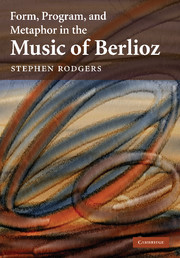Book contents
- Frontmatter
- Contents
- Music examples
- Figures
- Acknowledgments
- 1 Introduction
- 2 Preliminary examples and recent theories
- 3 Form as metaphor
- 4 Mixing genres, mixing forms: sonata and song in Le Carnaval romain
- 5 The vague des passions, monomania, and the first movement of the Symphonie fantastique
- 6 Love's emergence and fulfillment: the Scène d'amour from Roméo et Juliette
- 7 Epilogue
- Notes
- Bibliography
- Index
7 - Epilogue
Published online by Cambridge University Press: 27 June 2009
- Frontmatter
- Contents
- Music examples
- Figures
- Acknowledgments
- 1 Introduction
- 2 Preliminary examples and recent theories
- 3 Form as metaphor
- 4 Mixing genres, mixing forms: sonata and song in Le Carnaval romain
- 5 The vague des passions, monomania, and the first movement of the Symphonie fantastique
- 6 Love's emergence and fulfillment: the Scène d'amour from Roméo et Juliette
- 7 Epilogue
- Notes
- Bibliography
- Index
Summary
Berlioz and eccentricity
In the introduction to his translation of Berlioz's memoirs, David Cairns writes, “Today … the characteristics that once made [Berlioz's music] bizarrely unconventional … are once again quite natural; his originality, without having lost its vividness, no longer seems eccentric.” I have aimed in part to demystify some of Berlioz's music and to debunk some of the misconceptions about it: that it is formless, slapdash, so strange as to elude comprehension, resistant to analysis. My discussion of convention in the introduction to this study implied that we can look at Berlioz as having worked with the models he knew, for all he transformed them; and my hope is that the analyses in the preceding pages have made him out to be above all a craftsman, if often a heady and exuberant one – not “bizarrely unconventional” but mindfully experimental.
I also hope, however, to have shown that Berlioz's originality does in many respects still seem eccentric, and that, in fact, the more we delve into Berlioz's art, the more its eccentricities reveal themselves to us and the better we are able to appreciate them rather than wish them away. This is not to say that his music lacks logic. I would not have taken up this project if I did not believe that Berlioz's music was coherent and compelling. (Otherwise, there would be no point in analyzing it.)
- Type
- Chapter
- Information
- Form, Program, and Metaphor in the Music of Berlioz , pp. 135 - 140Publisher: Cambridge University PressPrint publication year: 2009



